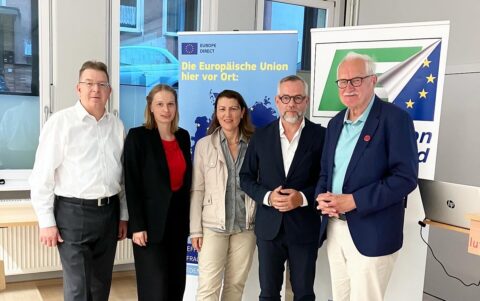Debating Europe: A Report
Re-mobilise the European Union as a peace project in an altered geopolitical environment, join forces in security and economic policy and move forward pragmatically! This was the conclusion of a discussion event with Prof. Sandra Eckert (Institute of Political Science, FAU), Günter Gloser and Michael Roth (both former Ministers of State, SPD) on 8 July in Nuremberg, initiated by the Europa-Union Nürnberg e.V. in cooperation with Europe Direct Nürnberg, the Evangelische Stadtakademie Nürnberg and the Friedrich-Ebert-Stiftung.
How much renewal does the European Union (EU) need in view of the current challenges? This was the core question addressed during the discussion event held at Haus Eckstein in Nuremberg. In his opening statement, Michael Roth, who was Minister of State for Europe and Chairman of the Foreign Affairs Committee of the German Bundestag in the last legislative period, urge the EU to strengthen its defence and security policy capacity and to let further member states join the Union. Roth, who announced his retirement from politics earlier in spring this year, spoke in Nuremberg as a ‘political person’ and not as a politician, and appealed to the audience to have a voice in the societal debate
The subsequent discussion between Michael Roth and Prof Sandra Eckert was moderated by Günter Gloser, who held various functions in the past and was Minister of State for Europe at the Federal Foreign Office between 2005 and 2009. Roth called for the EU to provide support for Ukraine in order not only to show strength as a response to Russia’s aggression, but also to send a geopolitical signal with regard to the expansion strategies of other major powers such as China. Eckert and Roth agreed that in view of the urgent need for action in many areas it is not the right time for the EU to aspire to major constitutional and institutional reforms. Instead, the available procedures, including enhanced cooperation or intergovernmental initiatives, should be used in a pragmatic way. Eckert further stressed that it is differentiated integration rather than a harmonised approach that is characteristic of how the EU moves ahead, and that in the current context member state coalitions in support of integration vary significantly across policy fields. She argued that despite the rise of Eurosceptic forces decision-making in the European Parliament and the Council has remained largely functional. Importantly, decisions in the Council are typically taken by consensus, even in the case of majority voting, which means that EU member states are not outvoted on a regular basis (with the exception of Hungary and Poland). Eckert came to the conclusion that the lengthy and cumbersome institutional structure of the EU shows resilience and stability. Roth’s proposal to send a clear signal of readiness for enlargement to states that are willing and able to join was discussed controversially with the audience.
Both Roth and Eckert see the current situation as an opportunity to re-mobilise the EU as a peace project and to make innovative progress in key policy areas such as environmental and economic policy. This could, they hope, could make the European political project more attractive, especially in contrast to illiberal forces.
